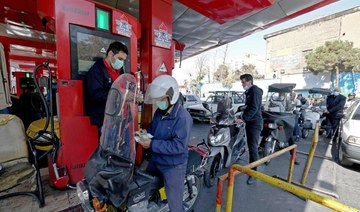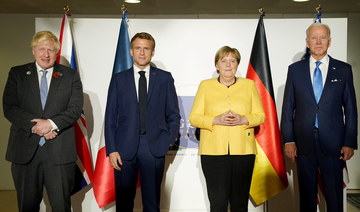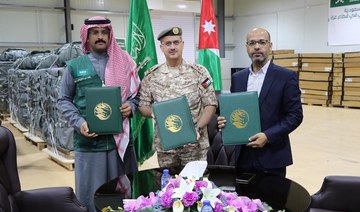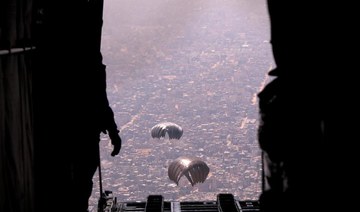WASHINGTON: The United States was “absolutely in lock step” with Britain, Germany and France on getting Iran back into a nuclear deal, Secretary of State Antony Blinken said on Sunday, but he added it was unclear if Tehran was willing to rejoin the talks in a “meaningful way.”
Blinken’s remarks in an interview with CNN on Sunday come a day after the US, Germany, France and Britain urged Iran to resume compliance with a 2015 nuclear deal in order to “avoid a dangerous escalation.”
The accord, under which Iran curtailed nuclear work seen as a risk of developing nuclear weapons in exchange for a lifting of global sanctions, unraveled in 2018 after then-President Donald Trump withdrew the US, prompting Tehran to breach limits on uranium enrichment set by the pact.
“It really depends on whether Iran is serious about doing that,” Blinken said on Iran rejoining the nuclear talks. “All of our countries, working by the way with Russia and China, believe strongly that that would be the best path forward,” he added.
The nuclear deal is not the only point of contention between Iran and the US. On Friday, Washington issued a fresh round of Iran-related sanctions tied to an Islamic Revolutionary Guard Corps drone program that it said threatened regional stability.
President Joe Biden said on Sunday that the US will “respond” to actions Iran has taken against Washington’s interests, including drone strikes.
Leaders of the US, Britain, France and Germany, hoping to persuade Tehran to stop enriching uranium to near-weapons-grade levels, said on Saturday they wanted a negotiated solution.
“But we do not yet know whether Iran is willing to come back to engage in a meaningful way,” Blinken said on Sunday. “But if it isn’t, if it won’t, then we are looking together at all of the options necessary to deal with this problem.”
Iran’s foreign minister said separately on Sunday that if the US was serious about rejoining Tehran’s 2015 nuclear deal with world powers, Biden could just issue an “executive order,” the state-owned Iran newspaper reported.
“It is enough for Biden to issue an executive order tomorrow and they (US) announce they are rejoining the pact from the point where his predecessor left the deal,” Iranian Foreign Minister Hossein Amirabdollahian said. “If there is a serious will in Washington to return to the deal, there is no need for all these negotiations at all.”
Talks between Iran and world powers aimed at salvaging the deal, which started in April, are slated to resume at the end of November, the Islamic Republic’s top nuclear negotiator said on Wednesday.
US says it is in talks with allies on getting Iran to agree to nuclear deal
https://arab.news/v4rnt
US says it is in talks with allies on getting Iran to agree to nuclear deal
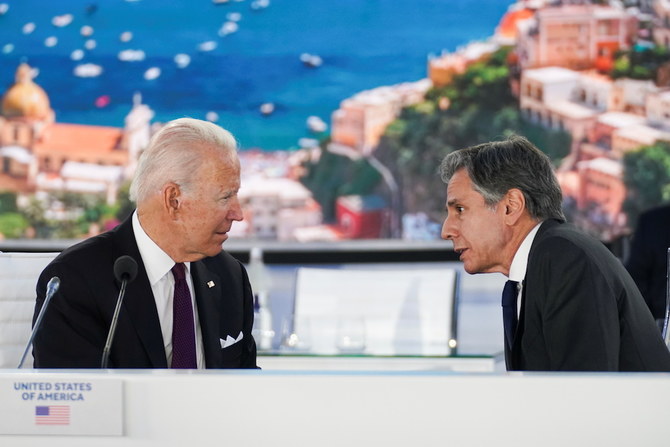
- Biden says the US will respond to actions Iran has taken against Washington’s interests, including drone strikes
‘No joy’: Gazans mark somber Eid in shadow of war

- Many Palestinians forced to spend holiday without their loved ones
- I hope the world will put pressure to end the war on us because we are truly dying, and our children are broken
GAZA STRIP: In tents in the stifling heat and bombed-out mosques, Gazans on Sunday marked the start of the Eid Al-Adha holiday, devoid of the usual cheer as the Israel-Hamas war raged on.
“There is no joy. We have been robbed of it,” said Malakiya Salman, a 57-year-old displaced woman now living in a tent in Khan Younis City in the southern Gaza Strip.
Gazans, like Muslims the world over, would usually slaughter sheep for the holiday — whose Arabic name means “feast of the sacrifice” — and share the meat with the needy.
Parents would also give their children new clothes and money for the celebration.
But this year, after more than eight months of a devastating Israeli campaign that has flattened much of Gaza, displaced most of the besieged territory’s 2.4 million people, and sparked repeated warnings of famine, the Eid is a day of misery for many.
“I hope the world will put pressure to end the war on us because we are truly dying, and our children are broken,” said Salman.
Her family was displaced from the far-southern city of Rafah, a recent focus of the fighting which began after Hamas’s Oct. 7 attack on southern Israel.
The military on Sunday morning announced a “tactical pause of military activity” around a Rafah-area route to facilitate the delivery of desperately needed humanitarian aid to Gazans.
AFP correspondents said there were no reports of strikes or shelling since dawn, though the Israeli military stressed there was “no cessation of hostilities in the southern Gaza Strip.”
The brief respite in fighting allowed worshippers a rare moment of calm on holiday.
Many gathered for the Eid Al-Adha morning prayer in the courtyard of Gaza City’s historic Omari Mosque, which was heavily damaged in Israeli bombardment, placing down their frayed prayer mats next to mounds of rubble.
The sound of prayers traveled down some of the city’s destroyed and abandoned streets.
“Since this morning, we’ve felt a sudden calm with no gunfire or bombings ... It’s strange,” said 30-year-old Haitham Al-Ghura from Gaza City.
He hoped the pause meant a permanent ceasefire was near, though truce mediation efforts have stalled for months.
In several areas of the war-battered territory, especially in Gaza City, young boys were seen manning roadside shops selling perfumes, lotions, and other items against the backdrop of piles of rubble from destroyed buildings and homes.
Many vendors used umbrellas to protect themselves from the scorching sun as they sold household items on Gaza City’s main market street. But there were few buyers.
Food and other goods can reach four or five times their usual price, but those who cling to the holiday traditions can still afford them.
In Khan Younis, displaced man Majdi Abdul Raouf spent 4,500 shekels ($1,200) — a small fortune for most Gazans — on a sheep to sacrifice.
“I was determined to buy it despite the high prices, to perform these rituals and bring some joy and happiness to the children in the displacement camp,” said the 60-year-old, who fled his home in Rafah.
“There is sadness, severe pain, and suffering, but I insisted on having a different kind of day.”
The deadliest-ever Gaza war began after Hamas’s unprecedented Oct. 7 attack.
Israel’s retaliatory offensive has killed at least 37,337 people in Gaza, also mostly civilians, according to the Health Ministry in the territory.
For many, a halt in fighting can never bring back what has been lost.
“We’ve lost many people, there’s a lot of destruction,” said Umm Mohammed Al-Katri from Jabalia refugee camp in northern Gaza.
“This Eid is completely different,” she said, with many Gazans forced to spend the holiday without their loved ones killed or displaced during the war.
Grieving families on Sunday flocked to cemeteries and other makeshift burial sites, where wooden planks marked the graves.
“I feel comfort here,” said Khalil Diab Essbiah at the cemetery where his two children are buried.
Even with the constant buzzing of Israeli drones overhead, visitors at the cemetery “can feel relieved of the genocide we are in and the death and destruction,” he said.
Hanaa Abu Jazar, 11, also displaced from Rafah to the tent city in Khan Yunis, said: “We see the (Israeli) occupation killing children, women and the elderly.”
“How can we celebrate?” asked the girl.
Jordan conducts three airdrops in southern Gaza

- Aid packages containing food, clothing, and sweets were delivered to various locations in the southern Gaza
AMMAN: Jordan’s armed forces conducted three airdrops to the southern part of Gaza on Sunday, in collaboration with Egypt, to mark the first day of Eid Al-Adha, Jordan News Agency reported.
Aid packages containing food, clothing, and sweets were delivered to various locations in the southern Gaza Strip by two planes from the Royal Jordanian Air Force and an aircraft from Egypt.
Earlier on Saturday, a 45-truck humanitarian aid convoy arrived in Gaza, sent by the JAF and the Jordan Hashemite Charity Organization (JHCO).
In cooperation with its regional and international allies, the Jordanian armed forces have carried out 261 airdrops and delivered 1,970 trucks of aid since the beginning of Israel’s onslaught on Gaza.
WHO chief Tedros Adhanom Ghebreyesus said that “a significant proportion of Gaza’s population is now facing catastrophic hunger and famine-like conditions,” as Israel continues to impose severe restrictions on the supply of food, water, medicine, and fuel to the Strip.
Kuwait Red Crescent distributes meat to Lebanese families, Syrian, Palestinian refugees

- Initiative follows last week's distribution of Eid Al-Adha packages by the KRCS
LONDON: The Kuwait Red Crescent Society (KRCS) has launched an initiative to distribute meat to around 1,500 Lebanese families, as well as Syrian and Palestinian refugees in Lebanon, in celebration of Eid Al-Adha, Kuwait News Agency reported on Sunday.
Youssef Boutros, relief coordinator of the Lebanese Red Cross (LRC), announced that the distribution process had begun on Sunday.
This initiative follows last week's distribution of Eid Al-Adha packages by the KRCS, which included clothes and other essentials for around 2,000 families, covering Lebanese families and Syrian and Palestinian refugees.
In addition to these efforts, the KRCS is continuing its humanitarian aid to 6,000 Lebanese families in southern Lebanon, who have been affected by military confrontations between Hezbollah and Israel since October.
This aid, which includes food and staple supplies, is being distributed with the assistance of the LRC.
ICC members demand end to ‘intimidation’ so court can carry out work

- Group of 93 states issues statement amid reports of Israeli activities against court
- Call is also in response to the behavior of other countries
LONDON: A group of 93 states has demanded the International Criminal Court be allowed to work “without intimidation” after reports that Israel has been engaged in a nine-year clandestine campaign to undermine it.
In a statement the group said it would work to preserve the court’s “integrity from any political interference and pressure,” amid claims by the office of the ICC’s chief prosecutor, Karim Khan, that it has received threats after he requested arrest warrants for senior Israeli government and Hamas figures, including Israel’s prime minister, Benjamin Netanyahu, and Defense Minister Yoav Gallant.
The statement in defense of the ICC, which called on “all states to ensure full cooperation with the court for it to carry out its important mandate,” was drafted by Belgium, Chile, Jordan, Senegal and Slovenia after “eye-opening” revelations about Israeli intelligence operations against the court published in The Guardian. It was also signed by Western states including Germany, France, Canada and the UK.
A diplomatic source told the paper that the story had “made some (diplomats) realise that it’s time to put out some sort of statement from the states that belong to the court, responding to what has now come to light.”
The source added that the statement was not just aimed at the actions of Israeli intelligence agencies but was also a response to the behavior of other states, including a cyberattack on the ICC last year that came during investigations into senior Russian figures accused of involvement or complicity in crimes committed in Ukraine.
The source told The Guardian: “The court is going after some very powerful people, not just in the Palestine investigation, and it’s time to send a message that the state parties are there to defend it.”
Danya Chaikel, the International Federation for Human Rights’ representative to the ICC, said: “This is a unique moment of international solidarity, with 93 ICC states parties standing up for global justice and accountability for mass atrocities. They are collectively opposing the egregious threats to the court from powerful countries including Israel, the US and Russia, and strongly rejecting their efforts to manipulate the rule of law for political gains.”
Rare day of relative calm as Gaza sees ‘tactical pause’ for aid

- The pause came a day after eight Israeli soldiers were killed in a blast near the Rafah city
- It was one of the heaviest losses for Israel in more than eight months of war against Hamas
GAZA: Gaza saw its first day of relative calm in months Sunday, after Israel’s military said it would “pause” fighting daily around a southern route to facilitate aid flows, following repeated UN warnings of famine in the Palestinian territory.
“Compared with the previous days, today, the first day of Eid Al-Adha, is considered near calm and the calm has prevailed across all of Gaza,” Mahmud Basal, spokesman for the civil defense agency in Hamas-ruled Gaza, told AFP.
He said the exceptions included “some targeting” in Gaza City’s Shujaiya and Zeitun areas, as well as Israeli artillery fire in Rafah, southern Gaza.
AFP correspondents in Gaza’s north and center reported no fighting on Sunday morning, though they reported some shelling and at least one strike in Rafah and an air strike in central Gaza during the early evening.
The military stressed in a statement there was “no cessation of hostilities in the southern Gaza Strip.”
The announcement of a “local, tactical pause of military activity” during daylight hours in an area of Rafah came a day after eight Israeli soldiers were killed in a blast near the far-southern city and three more troops died elsewhere.
It was one of the heaviest losses for the army in more than eight months of war against Hamas militants.
“Since this morning, we’ve felt a sudden calm with no gunfire or bombings... It’s strange,” said 30-year-old Haitham Al-Ghura from Gaza City.
The United Nations welcomed the Israeli move, although “this has yet to translate into more aid reaching people in need,” said Jens Laerke, spokesman for the UN humanitarian agency OCHA.
He called for “further concrete measures by Israel to address longstanding issues” on aid needs.
Laerke told AFP Gazans “urgently need food, water, sanitation, shelter, and health care, with many living near piles of solid waste, heightening health risks.”
“We need to be able to deliver aid safely throughout Gaza,” he added.
The UN and aid groups have repeatedly voiced alarm over dire shortages of food and other essentials in the Gaza Strip.
This has been exacerbated by overland access restrictions and the closure of the key Rafah crossing with Egypt since Israeli forces seized the Palestinian side in early May.
Israel has long defended its efforts to let aid into Gaza including via its Kerem Shalom border near Rafah, blaming militants for looting supplies and humanitarian workers for failing to distribute them to civilians.
The pause “for humanitarian purposes will take place from 8:00 am (0500 GMT) until 7:00 p.m. (1600 GMT) every day until further notice along the road that leads from the Kerem Shalom crossing to the Salah Al-Din road and then northwards,” a military statement said.
A map released by the army showed the declared humanitarian route extending until Rafah’s European Hospital, about 10 kilometers (six miles) from Kerem Shalom.
The announcement came as Muslims the world over mark Eid Al-Adha, or the feast of the sacrifice.
“This Eid is completely different,” said Umm Muhammad Al-Katri in northern Gaza’s Jabalia refugee camp.
“We’ve lost many people. There’s a lot of destruction. We don’t have the joy we usually have,” she told AFP.
Instead of a cheerful holiday spirit, “I came to the Eid prayers mourning. I’ve lost my son.”
The military said the pause was already in effect as part of efforts to “increase the volumes of humanitarian aid” following discussions with the United Nations and other organizations.
The eight soldiers killed Saturday were hit by an explosion as they traveled in an armored vehicle near Rafah, the military said. Troops were engaged in fierce street battles against Palestinian militants there.
Military spokesman Rear Admiral Daniel Hagari said the blast was “apparently from an explosive device planted in the area or from the firing of an anti-tank missile.”
Separately, two soldiers were killed in fighting in northern Gaza and another succumbed to wounds from recent fighting.
Abu Obaida, spokesman for Hamas’s military wing, vowed to “continue our painful strikes against the enemy wherever it may be.”
Saturday’s losses brought the Israeli military’s overall toll to 309 deaths since it began its ground offensive in Gaza on October 27.
Israeli Prime Minister Benjamin Netanyahu offered his condolences following “this terrible loss” and said that “despite the heavy and unsettling price, we must cling to the goals of the war.”
Israel has vowed to destroy Hamas following the Palestinian group’s unprecedented October 7 attack that resulted in the deaths of 1,194 people, mostly civilians, according to an AFP tally based on Israeli official figures.
The militants also seized 251 hostages. Of these, 116 remain in Gaza, although the army says 41 are dead.
Israel’s retaliatory offensive has killed at least 37,337 people in Gaza, also mostly civilians, according to the territory’s health ministry.
The latest toll includes at least 41 deaths over the previous 24 hours, it said.
Egyptian, Qatari and US mediators have been pushing for a new Gaza truce, so far without success.
The only previous truce lasted one week in November and saw many hostages released in exchange for Palestinian prisoners held in Israeli jails, while increased aid flowed into Gaza.
Hamas has insisted on the complete withdrawal of Israeli forces from Gaza and a permanent ceasefire — demands Israel has repeatedly rejected.
US Secretary of State Antony Blinken has said Israel backs the latest plan but Netanyahu, whose far-right coalition partners are strongly opposed to a ceasefire, has not publicly endorsed it.
Israel’s hard-line National Security Minister Itamar Ben Gvir said Sunday the humanitarian pause announced by the military was part of a “crazy and delusional approach.”
In early November, the United States said Israel had agreed to humanitarian pauses of four hours. One such pause occurred on December 14, COGAT, the Israeli defense ministry body responsible for Palestinian civilian affairs, said at the time.



